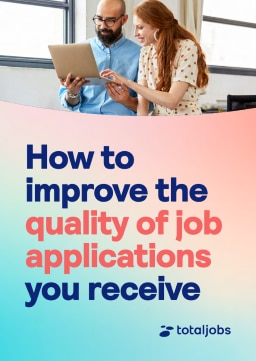
AI in Recruitment: How it works
Table of Contents
- Understanding AI in recruitment
- AI technologies in recruitment
- The benefits of AI
- Challenges and considerations
- Practical applications
- Emerging trends
- The future of recruitment
- FAQs

Decoding Global Talent: Work Preferences in the Age of GenAI
According to our research, UK recruiters typically handle four roles a month, spending over three hours screening CVs for each one. With 28% of candidates dropping out due to slow, unclear processes, it’s no surprise that many hiring managers are turning to artificial intelligence (AI) to streamline hiring.
In this article, we’re taking a closer look at AI in recruitment, the benefits and challenges it brings, and how it could transform your talent acquisition processes.
Understanding AI in recruitment
Artificial Intelligence in recruitment refers to the use of intelligent systems designed to replicate and enhance human decision-making throughout the hiring process. These technologies leverage vast datasets, predictive analytics, and natural language understanding to make recruitment:
- Faster
- Accurate
- Efficient
AI has evolved from simple automation tools to sophisticated platforms capable of sourcing candidates, screening CVs, conducting assessments, and even predicting employee success.
Core AI technologies in recruitment
AI encompasses a range of technologies designed to mimic human intelligence and automate complex tasks across various industries. At its foundation are several key technologies that enable machines to learn from data, understand human language, and make predictions about future outcomes.
While these technologies have broad applications, from healthcare and finance to customer service and manufacturing, they also play a pivotal role in transforming recruitment.
Machine Learning (ML)
Machine Learning is a subset of AI focused on developing algorithms that learn patterns from historical data and improve their performance over time without explicit programming.
ML models identify correlations and trends within large datasets, enabling systems to make informed decisions or predictions. In recruitment, for example, ML analyses data such as candidate qualifications, interview results, and employee retention to predict which applicants are most likely to succeed.
Over time, these models refine their accuracy as they process more data, helping recruiters prioritise candidates with the highest potential.
Natural Language Processing (NLP)
Natural Language Processing enables machines to comprehend, interpret, and generate human language in a meaningful way. This technology underpins many AI applications that involve text or speech, such as:
- Virtual assistants
- Language translation
- Sentiment analysis
In the context of recruitment, NLP powers tools that analyse CVs by extracting key information from unstructured text, optimise job descriptions to appeal to diverse audiences, and facilitate interactive chatbots that engage candidates.
Additionally, NLP can analyse the tone and sentiment of candidate communications or video interviews, offering deeper insights into their suitability and engagement.
Predictive analytics
Predictive analytics combines AI and statistical techniques to analyse historical and real-time data, forecasting future events or behaviours. By identifying patterns and trends, predictive models help organisations make proactive, data-driven decisions.
In recruitment, predictive analytics can forecast things turnover risk, assess cultural fit, and anticipate workforce needs, enabling HR teams to plan hiring strategies more effectively and reduce costly employee churn.
The benefits of AI in the recruitment process
Artificial intelligence is helping to reshape recruitment with transformative benefits across multiple touchpoints in the hiring journey. From reducing manual workload to improving decision-making and candidate engagement, AI empowers organisations to hire smarter and faster.
Below we’re looking at some of these benefits in detail, illustrating how AI addresses persistent challenges faced by recruiters.
1. Maximising recruitment efficiency
Recruitment is often bogged down by time-consuming administrative tasks that detract from strategic priorities. For example, we found that recruiters spend an average of 17.7 hours per vacancy on manual activities such as:
- Screening CVs
- Scheduling interviews
- Post-interview processing
These tasks not only slow down the hiring process but also divert valuable time away from engaging candidates and building employer brand reputation.
AI technologies have the ability to automate many of these routine processes. For example, AI can generate and publish job advertisements, screen applications against role criteria, schedule interviews automatically, and update candidate records in HR systems. By offloading these administrative burdens, AI frees recruiters to focus on higher-value activities that require human insight and relationship-building.
The cost of inefficiency is significant. Our findings suggest that manual tasks translate into hidden costs of nearly £16,728 annually per recruiter. Automating these processes not only reduces expenses but also accelerates hiring cycles, enabling organisations to secure top talent before competitors.
2. Slashing time to hire
Speed is critical in recruitment, with time-to-hire, often prolonged by slow feedback loops and administrative bottlenecks. AI can help accelerate hiring by enabling parallel workflows. For example, while recruiters conduct interviews with shortlisted candidates, AI continues sourcing and screening new applicants in the background.
One of the most impactful time savers is automating interview scheduling, which alone consumes 2.5 hours per vacancy. AI tools coordinate calendars, send reminders, and manage rescheduling seamlessly, reducing delays and improving candidate experience.
Faster hiring not only fills vacancies promptly but also prevents loss of high-quality candidates who might accept competing offers.
3. Reducing bias and promoting diversity
Unconscious bias remains a major barrier to diversity and inclusion in recruitment. Such biases can limit access to opportunities for underrepresented groups and undermine organisational goals for inclusive workplaces.
AI offers a powerful countermeasure when developed and deployed responsibly. Through training on unbiased datasets and undergoing regular audits, AI systems evaluate candidates objectively, focusing solely on:
- Skills
- Experience
- Qualifications
Additionally, AI-powered tools assist recruiters in crafting inclusive job descriptions by identifying and flagging gendered or exclusionary language that might deter diverse applicants. This helps organisations attract a broader talent pool and fosters fairer hiring practices.
4. Enhancing candidate experience
Candidate experience is a critical factor in attracting and retaining top talent. However, 28% of applicants abandon recruitment processes prematurely, often citing long timelines (25%) and poor communication (23%) as key frustrations. Further, we found that candidates consistently express the need for:
- Transparency about role requirements (39%)
- Salary clarity (35%)
- Faster feedback (34%)
AI-driven chatbots and communication platforms can address these concerns by providing instant, personalised updates and answering candidate queries 24/7.
Moreover, 77% of candidates say that application status trackers would improve their experience, allowing them to monitor progress in real time. This continuous engagement builds trust, enhances employer brand reputation, and increases the likelihood of candidate acceptance.
5. Improving quality of hires
Hiring the wrong candidate is costly. A poor hire can cost an organisation up to 30% of the employee’s first-year salary when considering recruitment expenses, onboarding, and lost productivity. AI mitigates this risk by leveraging predictive analytics to identify candidates with the highest likelihood of success and retention.
By analysing data points such as skills, behavioural traits, and cultural fit, AI helps recruiters make more informed decisions. This leads to better-quality hires, reduced turnover, and improved workforce productivity, outcomes that have a direct positive impact on organisational performance.
Challenges and ethical considerations
While AI offers significant advantages, its adoption in recruitment also raises important challenges and ethical questions. Organisations must navigate these carefully to ensure responsible and effective use of AI technologies.
Data privacy and security
Recruitment processes involve handling sensitive personal data, including:
- CVs
- Interview recordings
- Assessment results
AI tools must comply with data protection regulations such as GDPR, ensuring secure storage, processing, and transmission of candidate information. Failure to safeguard data can lead to breaches, legal penalties, and reputational damage.
Algorithmic bias and fairness
AI systems learn from historical data, which may contain embedded biases reflecting past hiring practices or societal inequalities. So, without proper oversight, AI can perpetuate or even amplify these biases, disadvantaging certain groups.

Tip: To maintain fairness, organisations should conduct regular audits of AI algorithms, use diverse and representative training datasets, and adopt explainable AI models that provide transparency into decision-making processes.
Transparency and explainability
Many AI models operate as “black boxes,” making it difficult to understand how specific hiring decisions are reached. This opacity can erode trust among candidates and recruitment teams.
Organisations should prioritise AI solutions that offer clear, interpretable reasoning and maintain human oversight to validate and contextualise AI recommendations.
Practical applications of AI in recruitment
AI’s versatility allows it to support every stage of the recruitment lifecycle, delivering measurable improvements in efficiency, accuracy, and candidate engagement.
Candidate sourcing
AI-powered sourcing tools have the ability to scan job boards, social media platforms, and internal databases to identify both active and passive candidates who match job requirements.
In the UK, paid job listings are the most effective channel, yielding hires in 70% of cases overall and 73% for large businesses. Careers pages and employee referrals also remain important. AI enhances these channels by matching candidates to roles in real time, increasing sourcing precision and reach.
CV and applicant screening
Recruiters frequently struggle with irrelevant applications. 72% report this slows them down.
AI reduces screening time by automatically parsing and scoring CVs against role-specific criteria. It also revisits past applicants’ data to identify potential matches for new roles, giving candidates “second chances” and improving talent retention.
Talent assessment
AI-driven assessments employ gamified tests, behavioural analysis, and personality profiling to predict cultural fit and job performance. These objective measures complement human judgement, accelerating decision-making and improving hire quality.
Interviewing
AI tools have the capacity to automate several interview-related tasks and thereby increase the efficiency of the entire hiring process This includes:
- Pre-screening interviews: Chatbots conduct initial candidate screening, filtering out unsuitable applicants early.
- Scheduling: Automating interview scheduling can save recruiters 2.5 hours per vacancy.
- Transcription and summarisation: AI can transcribe interviews and generates summaries, facilitating easier collaboration among hiring teams.
- Verbal and non-verbal analysis: AI tools analyse tone, facial expressions, and body language to provide deeper insights into candidate suitability.

Check out our free guide to conducting candidate interviews for insights into how a structured process can help you identify and onboard talent with the skills you need.
Offer generation and onboarding
AI can be used to generate customised offer letters based on candidate profiles and organisational policies. It can also tailors onboarding resources to individual learning styles and needs, helping to improve early engagement and retention in the process.
Emerging trends
The use of AI in recruitment is still in the relatively early stages and continues to evolve rapidly. As a result, there are several exciting trends on the horizon that employers and recruiters should keep an eye out for, including:
- Dynamic job descriptions: AI may have the capacity to auto-optimise adverts based on real-time market trends and candidate behaviour, attracting better-fit applicants.
- AI-driven talent marketplaces: Platforms could begin to instantly match candidates and employers, reducing time-to-hire and improving fit.
- Smart offer negotiations: AI may play a role in personalising compensation packages dynamically, balancing candidate expectations and organisational budgets to maximise acceptance rates.
- AI-powered internal mobility: AI tools might ultimately be able to identify and promote internal candidates for open roles, reducing external hiring costs and improving employee retention.
AI and the future of recruitment
AI is already revolutionising many recruitment processes by automating repetitive tasks, enhancing candidate evaluation, and improving hiring experiences. With recruiters facing 17.7 hours of administrative work per vacancy and struggling with irrelevant applications, AI delivers significant time and cost savings.
However, human insight remains critical for fairness, cultural fit, and empathy. The future of recruitment lies in balancing AI’s efficiency with human judgement to build smarter, faster, and more inclusive hiring processes.
Frequently asked questions (FAQs)
How does AI reduce bias in recruitment?
AI evaluates candidates based on objective data like skills and experience, minimising unconscious human biases. Additionally, AI tools can detect biased language in job adverts and suggest inclusive alternatives.
What are common AI tools used in recruitment?
Popular AI tools include resume screening software, chatbots for candidate communication, automated interview schedulers, AI-driven assessments, and predictive analytics platforms.
How can organisations ensure ethical AI use?
Regularly audit AI algorithms for bias, use diverse training data, maintain transparency about AI’s role, and keep human oversight in decision-making.
How does AI improve candidate experience?
AI-powered chatbots provide instant responses and status updates, reducing candidate anxiety and improving engagement throughout the hiring process.
Is AI suitable for all types of recruitment?
AI is especially effective for high-volume hiring but can also support specialised roles when combined with appropriate data and human judgement.
Explore articles
Receive the latest recruitment resources and
advice to boost your hiring
By providing us with your details you agree to our privacy policy and for us to keep you updated with the latest news, events,
and special offers from Totaljobs.









